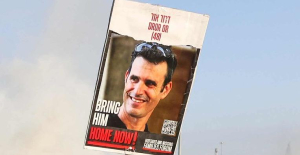How can we characterize the crimes perpetrated by Hamas on October 7, which sent shock waves through Israel? The debate raises the French political class, while La France insoumise refuses to qualify the Palestinian Islamist organization as “terrorist”. On Wednesday, its leader Jean-Luc Mélenchon assumed this position, arguing that the qualification of “war crimes” was more relevant for international law to address.
But is this argument understandable from a legal point of view? Le Figaro interviewed William Julié, international law lawyer at the Paris bar, to find out more.
LE FIGARO. - To defend LFI's position on Hamas, Jean-Luc Mélenchon asserts that "if we agreed to characterize a war action as terrorist, we would remove it from international law." What do you think ?
WILLIAM JULIE. - I have difficulty understanding his reasoning and more particularly what “abstract from international law” means. Legally speaking, this doesn't mean much. The law is binary: making a legal qualification is consistent with the law, whether national or international, or it is not. For me, there is nothing to subtract or add.
When he says that “international law does not provide for any terrorist designation,” is he right?
This is inaccurate or at least incomplete. The European Union, for example, has a list with a financial sanctions regime which concerns organizations or individuals belonging to terrorist organizations. On this list, which contains 13 people and 21 organizations, Hamas has appeared since 2001. The criterion for being placed there is the fact that there is an ongoing investigation or prosecution of the terrorism charge in a member state, which would be perfectly possible in France, with regard to passive jurisdiction in the event of a French victim.
There is also a directive from the European Parliament and a common position from the Council giving precise legal definitions of what is an act of terrorism, and an organization of a terrorist nature. The “denomination”, in fact, is very clear: “For the purposes of this common position, “terrorist act” means one of the following intentional acts which, taking into account its nature or context, may cause serious harm to a country or an international organization (...): attacks on the life of a person which could lead to death; attacks on the physical integrity of a person; kidnapping or hostage-taking, (...)”.
Why does he say that only “war crimes” can punish Hamas’ abuses?
Mr. Mélenchon confuses things a little. While it is true that there does not exist in international law an independent offense of terrorist crime (no general consensus between UN member states having been able to be found to define this crime), it remains no less than the notion of terrorism (and incidentally of crime and terrorist organization) does indeed exist. The United Nations Office on Drugs and Crime (UNODC), for example, considers that individual acts of terrorism may well fall into the category of war crimes or crimes against humanity. The terrorist reality is recognized by international law. Likewise, the crime of terrorism was recognized by the Special Tribunal for Lebanon under a customary rule of international law.
I believe that LFI draws the debate towards something which is not so much law, but rather a political declaration.
Is qualifying an act as “terrorist” contradictory with qualifying it as a “war crime”?
No, there is no contradiction between one and the other qualification. Several legal qualifications can be retained for the same act, concurrently. This is called the ideal competition of offenses.
For me, the relevant discussion is that which concerns the correct legal classification. The law's mission is to be as precise as possible regarding the reality it covers. It is the job of the legislator to define criminal offenses, then of judicial officers and magistrates to apply the law. If French law includes different criminal qualifications for terrorist acts, war crimes and crimes against humanity, it is because their constituent elements differ. The debate is therefore that of knowing which one, or which ones, are the most adapted to the abuses of Hamas last weekend in Israel.

 Who was Dror Or, the Israeli father who died as a hostage in the hands of Hamas?
Who was Dror Or, the Israeli father who died as a hostage in the hands of Hamas? “Pay in cash”: at his trial, Donald Trump faced with an embarrassing recording
“Pay in cash”: at his trial, Donald Trump faced with an embarrassing recording Italy: a grandmother accidentally serves a bottle filled with wine to a baby, he has an alcoholic coma
Italy: a grandmother accidentally serves a bottle filled with wine to a baby, he has an alcoholic coma The mysterious skeletons of Hermann Göring's villa
The mysterious skeletons of Hermann Göring's villa Children born thanks to PMA do not have more cancers than others
Children born thanks to PMA do not have more cancers than others Breast cancer: less than one in two French women follow screening recommendations
Breast cancer: less than one in two French women follow screening recommendations “Dazzling” symptoms, 5,000 deaths per year, non-existent vaccine... What is Lassa fever, a case of which has been identified in Île-de-France?
“Dazzling” symptoms, 5,000 deaths per year, non-existent vaccine... What is Lassa fever, a case of which has been identified in Île-de-France? Sánchez cancels his agenda and considers resigning: "I need to stop and reflect"
Sánchez cancels his agenda and considers resigning: "I need to stop and reflect" What is the 'phantom flight' scandal for which Qantas is being forced to pay a hefty fine?
What is the 'phantom flight' scandal for which Qantas is being forced to pay a hefty fine? The State renews its promises of support for the automobile industry
The State renews its promises of support for the automobile industry Jump in bankruptcies and decline in business creations: which departments suffered the most in 2023?
Jump in bankruptcies and decline in business creations: which departments suffered the most in 2023? After 50 years of existence, “Numbers and Letters” will disappear from the France Télévisions channels
After 50 years of existence, “Numbers and Letters” will disappear from the France Télévisions channels The incredible musical juggling of the Basketteuses de Bamako
The incredible musical juggling of the Basketteuses de Bamako Death of Frank Stella, the most spectacular painter-sculptor
Death of Frank Stella, the most spectacular painter-sculptor Film buff's memories of the Champs-Élysées, by Éric Neuhoff
Film buff's memories of the Champs-Élysées, by Éric Neuhoff Madonna thrills Brazilians on Copacabana beach
Madonna thrills Brazilians on Copacabana beach Omoda 7, another Chinese car that could be manufactured in Spain
Omoda 7, another Chinese car that could be manufactured in Spain BYD chooses CA Auto Bank as financial partner in Spain
BYD chooses CA Auto Bank as financial partner in Spain Tesla and Baidu sign key agreement to boost development of autonomous driving
Tesla and Baidu sign key agreement to boost development of autonomous driving Skoda Kodiaq 2024: a 'beast' plug-in hybrid SUV
Skoda Kodiaq 2024: a 'beast' plug-in hybrid SUV The home mortgage firm rises 3.8% in February and the average interest moderates to 3.33%
The home mortgage firm rises 3.8% in February and the average interest moderates to 3.33% This is how housing prices have changed in Spain in the last decade
This is how housing prices have changed in Spain in the last decade The home mortgage firm drops 10% in January and interest soars to 3.46%
The home mortgage firm drops 10% in January and interest soars to 3.46% The jewel of the Rocío de Nagüeles urbanization: a dream villa in Marbella
The jewel of the Rocío de Nagüeles urbanization: a dream villa in Marbella Facing Jordan Bardella, the popularity match turns to Gabriel Attal’s advantage
Facing Jordan Bardella, the popularity match turns to Gabriel Attal’s advantage Europeans: a senior official on the National Rally list
Europeans: a senior official on the National Rally list Blockade of Sciences Po: the right denounces a “drift”, the government charges the rebels
Blockade of Sciences Po: the right denounces a “drift”, the government charges the rebels Even on a mission for NATO, the Charles-de-Gaulle remains under French control, Lecornu responds to Mélenchon
Even on a mission for NATO, the Charles-de-Gaulle remains under French control, Lecornu responds to Mélenchon These French cities that will boycott the World Cup in Qatar
These French cities that will boycott the World Cup in Qatar PSG-Dortmund: Mbappé revanchist, guru Luis Enrique, volcanic Parc des Princes… Reasons to hope
PSG-Dortmund: Mbappé revanchist, guru Luis Enrique, volcanic Parc des Princes… Reasons to hope “Canal will not be the gravedigger of French football”: the boss of the encrypted channel breaks the silence on Ligue 1 TV rights
“Canal will not be the gravedigger of French football”: the boss of the encrypted channel breaks the silence on Ligue 1 TV rights Toulouse-Leinster: a dream final and some nightmares
Toulouse-Leinster: a dream final and some nightmares Lille-Lyon: Jonathan David against Alexandre Lacazette, scorers duel for Europe
Lille-Lyon: Jonathan David against Alexandre Lacazette, scorers duel for Europe


















